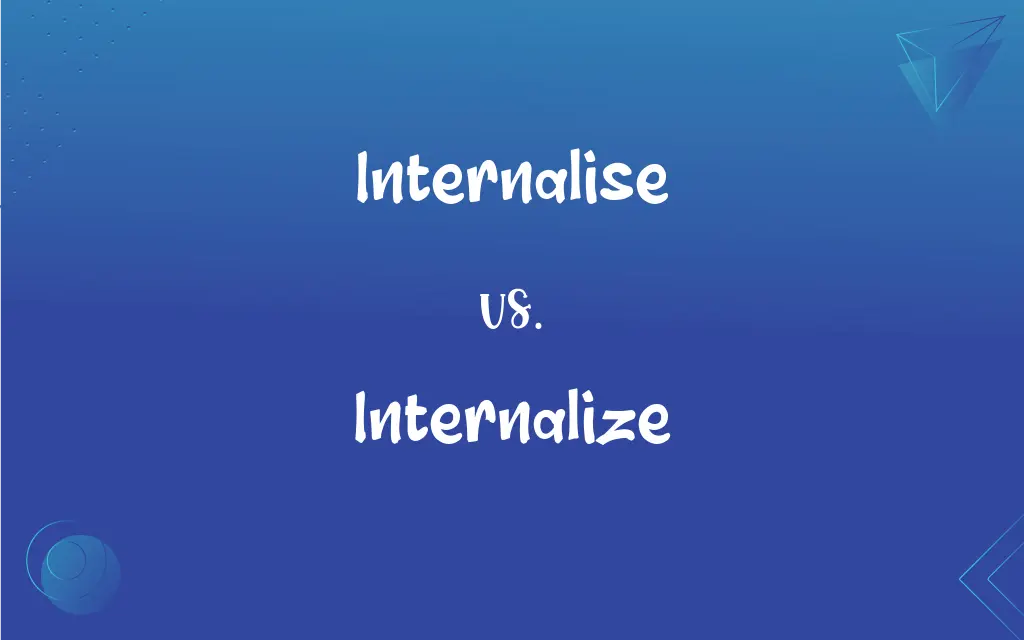Internalise vs. Internalize: What's the Difference?
Edited by Aimie Carlson || By Janet White || Updated on January 25, 2024
"Internalise" and "Internalize" mean the same: to incorporate within oneself ideas, attitudes, or behaviors. The difference is in spelling: "Internalise" is British English, "Internalize" is American English.

Key Differences
The words "internalise" and "internalize" refer to the process of integrating beliefs, attitudes, or behaviors into one's own thinking and actions. The only distinction between them is their spelling variation, which reflects the different conventions of British and American English.
In terms of usage, "internalise" is commonly used in British English-speaking countries, while "internalize" is preferred in American English. Both words are used in psychological and sociological contexts to describe the assimilation of external concepts into personal belief systems.
The spellings "internalise" and "internalize" highlight the subtle differences in English language usage across regions. These variations do not affect the meaning or usage of the word in sentences; they simply align with the spelling norms of the respective English varieties.
"Internalise" might appear in British publications and academic papers, while "internalize" is more likely to be found in American texts. The choice between these spellings depends on the intended audience and the linguistic standards of the region.
Both "internalise" and "internalize" carry the same implications in psychological theory, referring to the subconscious adoption of external ideas. This process is crucial in understanding individual behavior and societal influences, regardless of the spelling variation.
ADVERTISEMENT
Comparison Chart
Spelling
British English
American English
Usage in Literature
Common in UK and Commonwealth
Predominant in the USA
Appearance in Academia
Often in British publications
Frequent in American texts
Linguistic Preference
Preferred in British English
Favored in American English
Impact on Meaning
None
None
ADVERTISEMENT
Internalise and Internalize Definitions
Internalise
To make attitudes or behavior part of one's nature.
She internalised respect for diversity at an early age.
Internalize
Absorb and integrate within one's consciousness.
She internalized her coach's advice, enhancing her performance.
Internalise
Absorb and integrate within one's consciousness.
He internalised the principles of non-violence, practicing them in daily life.
Internalize
Subconscious assimilation of ideas, values.
Through their experiences, people often internalize societal norms.
Internalise
Subconscious assimilation of ideas, values.
Through storytelling, children internalise moral values.
Internalize
To make attitudes or behavior part of one's nature.
He internalized a sense of discipline from his military training.
Internalise
Incorporate external concepts into personal belief systems.
He internalised the feedback from his mentor, improving his skills.
Internalize
Adopting an external behavior as one's own.
Innovators internalize trends and insights to create new products.
Internalise
Adopting an external behavior as one's own.
Artists often internalise influences from their peers and surroundings.
Internalize
Incorporate external concepts into personal belief systems.
Students internalize knowledge from their studies over time.
Internalise
Standard spelling of internalize
Internalize
To make internal or cause to become internal.
Internalise
Same as internalize.
Internalize
To take in and make an integral part of one's attitudes or beliefs
Had internalized the cultural values of the Poles after a year of living in Warsaw.
Internalise
Incorporate within oneself; make subjectiveor personal;
Internalize a belief
FAQs
Is "internalise" more common in certain countries?
Yes, it's more common in British English-speaking countries.
Are "internalise" and "internalize" interchangeable?
Yes, they are interchangeable in meaning, differing only in regional spelling.
Where is "internalize" predominantly used?
It's predominantly used in American English.
What do "internalise" and "internalize" mean?
Both mean to incorporate ideas, attitudes, or behaviors into one's self.
Are there any contexts where one spelling is preferred?
Yes, academic or literary contexts often prefer the regional spelling.
Do these words have synonyms?
Yes, synonyms include assimilate, absorb, and integrate.
Is "internalize" acceptable in British English?
It can be used, but "internalise" is the standard British spelling.
Can these words be used in psychological therapy?
Yes, they're often used to describe the process of integrating therapeutic concepts.
Can "internalise" be used in American English?
It can be, but "internalize" is the standard American spelling.
Can "internalise" appear in American publications?
Rarely, as American publications usually adhere to American spelling.
Are these words used in everyday language?
They're more common in academic or psychological contexts.
Can "internalise" and "internalize" be used in business contexts?
Yes, in the context of adopting corporate values or practices.
Does the meaning change with spelling?
No, the meaning remains the same regardless of the spelling.
Are there any variations in usage?
No, the usage is the same in psychological and sociological contexts.
How do these words relate to personal development?
They describe the process of integrating external influences into personal growth.
Can either spelling be used in international contexts?
Yes, but it's advisable to stick to one standard for consistency.
Are there any exceptions in the usage of these words?
Not in terms of meaning, but regional spelling preferences may apply.
Do these words have the same pronunciation?
Yes, both words are pronounced the same.
Is one spelling more correct than the other?
No, the correctness depends on the regional language standard.
Is the spelling difference recognized by spell checkers?
Yes, depending on the language setting of the spell checker.
About Author
Written by
Janet WhiteJanet White has been an esteemed writer and blogger for Difference Wiki. Holding a Master's degree in Science and Medical Journalism from the prestigious Boston University, she has consistently demonstrated her expertise and passion for her field. When she's not immersed in her work, Janet relishes her time exercising, delving into a good book, and cherishing moments with friends and family.
Edited by
Aimie CarlsonAimie Carlson, holding a master's degree in English literature, is a fervent English language enthusiast. She lends her writing talents to Difference Wiki, a prominent website that specializes in comparisons, offering readers insightful analyses that both captivate and inform.
































































